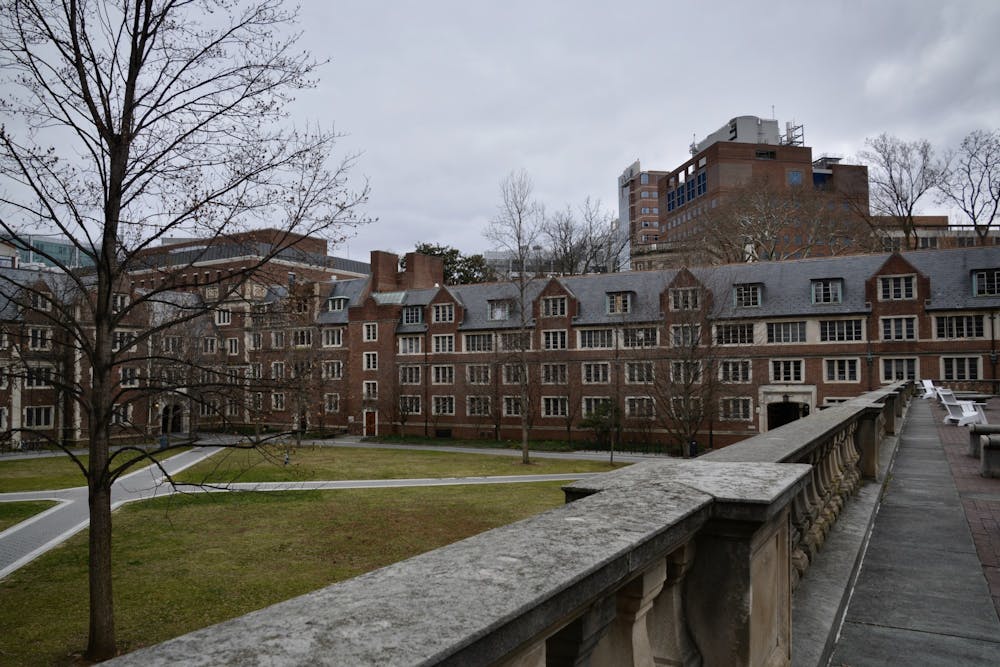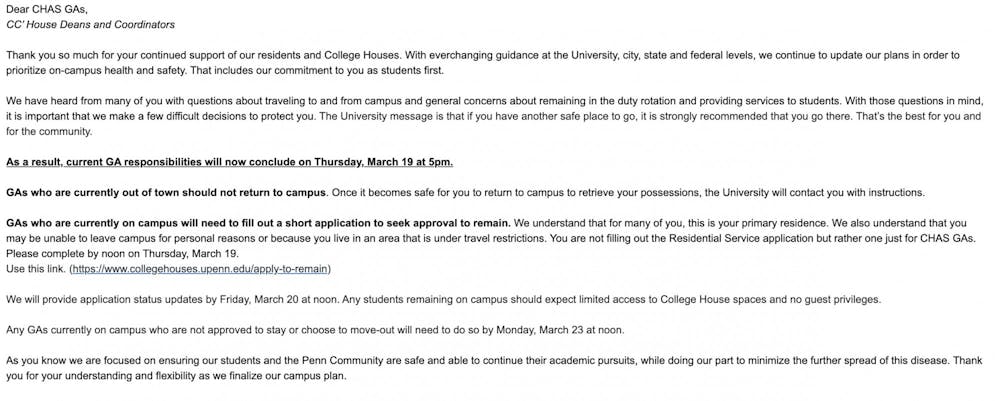
GAs were originally told they could stay in their college houses until June 1.
Credit: Kylie CooperCollege Houses and Academic Services is now requiring graduate associates to apply to remain in their college houses, after previously guaranteeing on-campus housing until June 1 following Penn's move to online classes.
GAs said they were frustrated by this sudden change and raised concerns about finding new housing with a six-day notice if not accepted to remain on campus.
An email from CHAS sent to GAs on March 17 read that current GA responsibilities conclude on March 19 and GAs who are out of town should not return to campus. CHAS wrote that GAs who are currently on campus should move out by March 23 at noon and those who must stay should fill out an application to remain on campus.
Just five days before, CHAS sent an email to GAs on March 12 ensuring that they would be able to remain in their dorms until their contracts expire on June 1.
Director of Four-Year Houses and Residential Programs at CHAS Ryan Keytack did not respond to multiple requests for comment.
GAs who apply to remain on campus will hear back from CHAS by March 20 at noon, although some students who filled out the application said they received a decision by March 18. GAs who are approved to stay should expect limited access to College House spaces and no guest privileges, according to the March 17 email sent by CHAS.
Email sent on March 12

Email sent on March 17

“This is our home,” Stouffer College House GA and Graduate School of Education second-year Jax Lastinger said. “It’s not like being an undergrad where you spend your summer at your parents’ house and then you come to school during the year. Our lives are here.”
Returning GAs are allowed on-campus housing over the summer. Lastinger, who is a second-year GA, stayed in Stouffer College House last summer.
Stouffer College House GA and Near Eastern Languages and Civilizations third-year Rawad Wehbe said his application to remain on campus was approved on Wednesday afternoon. He said, however, if he found out his application was not accepted on Friday, he would only have had the weekend to move out and secure a place to live in before classes resumed on Monday. He added that he would also have had to simultaneously prepare for NELC201 Modern Middle East Literature in Translation, the class for which he works as a teaching assistant.
“It seems as though the University took advantage of GAs, utilizing us to facilitate the move-out process when they needed us, and then once the undergraduates were evacuated from campus housing, once they were done using our resources, that’s when they decided to essentially tell us that it’s our turn to leave,” Wehbe said.
Wehbe said although the University did not require GAs to help undergraduate students physically move out of their dorms, many GAs including himself invested a lot of time providing students with emotional support, helping them de-stress, and answering their questions during a time of great confusion.
“[GAs were] under the impression that [they] would have housing for the entire year. How is Penn going to compensate if they do force certain GAs to leave?” said Riepe College House GA and School of Social Policy and Practice first-year Jasmine Blue.
CHAS provides GAs with free housing and a meal stipend in exchange for their responsibilities, which include supporting and advising undergrads living in College Houses. CHAS wrote in an email to GAs accepted to remain on campus that they will not be eligible for any additional compensation but will continue to have rent and meals covered.

Wehbe said that the one-week extension to spring break gave undergraduate students extra time to move out and settle into the place where they will finish the semester, while GAs have less than a week to make the transition. He added that the situation could have been handled better if the email from CHAS on March 17 offered to help GAs find ways to leave campus and secure housing, rather than throwing them into a panic about losing their homes.
Stouffer College House GA and School of SP2 first-year Paola Pérez said this change in housing policy will affect international and first-generation, low-income students the most.
“For a lot of students, especially first-generation, low-income graduate students who rely on the free housing and the small meal stipend, for us to suddenly cough up rent money in the next couple of months is very unrealistic,” Pérez said.
Pérez’s application to remain on campus was approved Wednesday afternoon, but she said she worries that the University could change its housing policy at any time as it had done earlier this week.
Stouffer College House GA and GSE second-year Xiong Her agreed that even after being granted approval to stay on campus, there remains a lot of uncertainty.
“Everyone is saying one thing today and then tomorrow will be another new decision by the higher up, so I don’t know what to expect,” Her said. “I don’t know what to ask as well, because there’s so much going on that what I asked today might be completely different tomorrow night.”
Her and Perez called on the University for more transparent communication to make the unprecedented situation easier on all students, particularly GAs and FGLI students.
The Daily Pennsylvanian is an independent, student-run newspaper. Please consider making a donation to support the coverage that shapes the University. Your generosity ensures a future of strong journalism at Penn.
Donate







